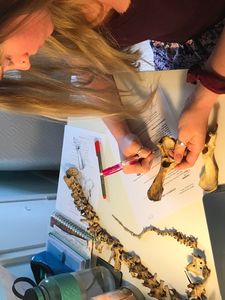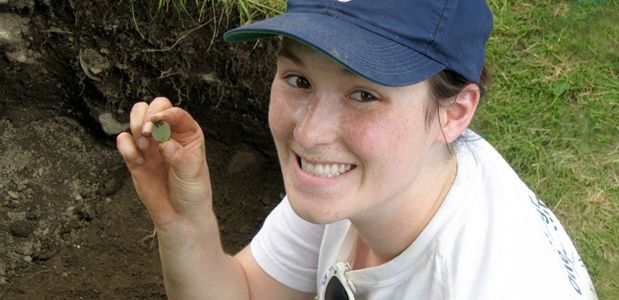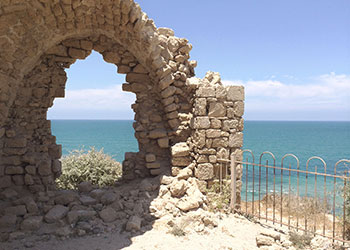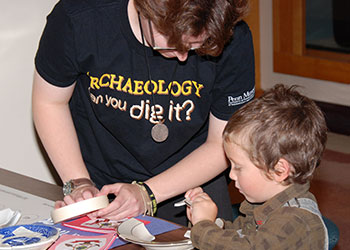Why Study Archaeology?
Archaeologists are in demand.
Many students come to formal archaeological study with a burning passion for the subject. To them, the answer to the question “Why study archaeology?” is simple: because they want to, and in many cases they have done so from an early age. Such individuals may well go on to earn multiple university degrees in archaeology and become professional archaeologists themselves. But for others, the situation may be less clear-cut, whether at a young age, once in college, or later. Many people may be uncertain about studying a subject with what seems, at first glance, limited wider applicability. This section is for these people: those who are interested in archaeology, but in doubt about its viability as a career.
You could simply look at a recent survey of careers, such as that completed by the US News and World Report, which lists archaeology as #7 among the best science jobs in the US. But what will archaeology teach you if you are interested in the subject but considering another career?
Archaeology is worth studying, from a single course right up to and even beyond a bachelor’s degree, because it offers an unrivaled array of transferable skill sets that can be used in virtually any corner of the world and in all job sectors. The UK’s Universities and Colleges Admissions Service (UCAS), for example, provides profiles, including employability skills profiles, of all the different subjects available in UK universities. The profile for archaeology (UCAS 2010a) includes the following  transferable—that is, non-archaeological—skills:
transferable—that is, non-archaeological—skills:
- Apply scholarly, theoretical, and scientific principles and concepts to specific problems.
- Use diverse sources of evidence to formulate an argument.
- Appreciate the importance of recovering primary data through practical experience.
- Critically apply methodlogies for quanitfying, analyzing, and interpreting primary data.
- Understand the concepts and applications of scientific methods used in collecting, analyzing, and interpreting data.
- Interpret spatial data.
- Select and apply appropriate statistical and numerical techniques.
- Marshal and critically appraise other people’s arguments.
- Produce logical and structured arguments supported by evidence.
- Communicate effectively orally, visually, and in writing to diverse audiences.
- Use IT, information retrieval, and presentation skills effectively in a variety of graphical media.
- Execute research, working independently.
- Collaborate effectively in a team.
- Be sensitive to different cultures and deal with unfamiliar situations.
- Be able to critically evaluate one’s own and others’ opinions.
UCAS also provide details (more than eleven pages’ worth) of specific employability skills (UCAS 2010b). These include a wide array of cognitive (i.e., thinking) skills matched with practical (i.e., doing) skills. This is also an observation backed up by successive government reviews of the subject within higher education, most recently in 2007, when the UK’s Quality Assurance Agency for Higher Education (QAA) last surveyed the subject and published its report (QAA 2007). At that time, the QAA commented:
The broad-based nature of the subject and of the skills it gives graduates provide a strong grounding for a wide range of career paths: the archaeology graduate is extremely well equipped with transferable skills from the mix of humanities and science training, engagement with theory and practice, and individual and team-based learning, together with the intellectual curiosity to continue learning, and the skills to benefit from challenging work environments. Archaeology also offers much non-professional involvement, via continuing education courses, local societies, museums, heritage groups and so on, so graduates not employed within archaeology have many opportunities for lifelong learning and to share their expertise within the community.
It is also notable that archaeology scores highly across the different types of learning styles that have been modeled. To take one example, the VARK neuro-linguistic model breaks learning styles down into: (1) visual (learning through seeing), (2) auditory (learning through listening), (3) reading/writing, and (4) kinesthetic/tactile (learning through doing) styles of learning. Archaeologists, and thus archaeology students, get to use all these different learning styles in their training and professional development, which makes archaeology an extremely engaging subject to study. As Indiana Jones put it: “It’s not the years… it’s the mileage”: archaeologists get a diverse array of attractive transferable skills under their belts and get to practice these skills on a regular basis.
Put another way, studying archaeology gets a big bang for the buck in terms of skills (see Jackson and Sinclair 2010). Archaeology is obviously worth studying because of one’s love for the subject, but even if one is only a little bit in love with it, studying it is not going to harm one’s future career prospects—indeed, the opposite may be true. Archaeology courses provide skills that can set someone up for life, and be interesting too. And archaeology, lest we forget, is also simply cool. How many people at a party do not want to meet an archaeologist? (Flatman 2001: 48–49)
The following excerpts are taken from Becoming an Archaeologist: A Guide to Professional Pathways by Joe Flatman. The book can be found in Mugar Library, call number CC107 .F53 2011.
Flatman, Joe. 2011. Becoming an Archaeologist: A Guide to Professional Pathways. Cambridge: Cambridge University Press. ISBN 978-0-521-73469-1.
Top Ten Tips for Budding Archaeologists
EXPLORE: The best way to get involved in archaeology is to find out what opportunities for participation are available in your own neighborhood, through your local archaeology or history society or club, national organizations or local government, schools or universities. There are talks, walks, guides, and events nearly every week around the world; there are also hundreds of opportunities every year to obtain more formal training in archaeological techniques and become involved in actual fieldwork. Many events are free; even the ones that cost are rarely all that expensive—archaeologists are well aware that people do not have that much money to spare and fight to keep costs of events down. Almost all events are advertised online. Membership in local or national archaeology organizations is similarly cheap and is an extremely good value—membership brings you into contact with like-minded people in your neighborhood and provides access to information and resources such as newsletters and magazines, events, and even library facilities.
READ: There are many good popular archaeology magazines now available, often from high-street newsagents rather than specialist vendors. These are a quick and enjoyable way to find out more about archaeology—imagine how much more interesting your daily commute could become if you are reading a magazine about someone exploring a new archaeological site rather than your local newspaper. There are also many excellent introductory books on the basic origins, and practice of archaeology—mostly published in paperback, cheap to buy, and easily purchased online.
WATCH: The chances are that if you are interested in getting more involved in archaeology, you are already doing this—there are so many good TV shows on archaeology these days, as well as online videos, that these have become the main entry point for budding archaeologists. But just in case you have not been watching these, then start! Not all archaeologists like all these shows, and as your knowledge of archaeology increases then you will rapidly begin to differentiate for yourself between the good and the bad programs in terms of the quality of the archaeology done and the validity of some of the claims. But nonetheless, many of these shows do a great job of introducing key concepts, ideas, and sites that are central to archaeology.
 LISTEN: As noted previously, there are talks, walks, guides, and events about archaeology nearly every week around the world and most of these events are free or very cheap—at most, a few pounds/dollars/euros to attend. A great place to look beyond your local archaeology society or club is your local university archaeology, anthropology, or history department: most have weekly talks scheduled by staff and visiting scholars. Although primarily designed for students and staff, visitors are normally welcome by prior arrangement, and such events are usually advertised on departmental homepages. Going to events such as these is a great way to meet real archaeologists and like-minded people.
LISTEN: As noted previously, there are talks, walks, guides, and events about archaeology nearly every week around the world and most of these events are free or very cheap—at most, a few pounds/dollars/euros to attend. A great place to look beyond your local archaeology society or club is your local university archaeology, anthropology, or history department: most have weekly talks scheduled by staff and visiting scholars. Although primarily designed for students and staff, visitors are normally welcome by prior arrangement, and such events are usually advertised on departmental homepages. Going to events such as these is a great way to meet real archaeologists and like-minded people.
TALK: Archaeologists are friendly people who love their subject. They want to tell other people about it and help them get involved. Never be afraid to look up archaeologists who work in your neighborhood and ask them for advice on how to participate. They may not be able to help you themselves, but they will know other people who can help you and be able to put you in contact with them. A good starting point is either your local archaeology society or your local government archaeologist—both can be searched for online. If these people cannot help you, then your local university archaeology department should be able to help.
For those of you interested in taking the next step, considering not only becoming involved in archaeology but possibly pursuing a career as an archaeologist, the next five steps are especially for you:
 PLAN: Start out by asking yourself what you want out of archaeology—do you really want a career as an archaeologist, to earn a living doing this? Or rather, do you simply want to become more involved in fieldwork? Understand the implications of a career in archaeology from the outset—long years of training, limited job opportunities, low pay, and often short employment contracts—and place this against your other personal aspirations and commitments. Talk about your aspirations with your family and what this lifestyle might mean for them, and be realistic—if you have always wanted a big house and a luxury car in your driveway, then archaeology really is not the career for you. Once you have come to a decision, plan what you need to do to make a start in your career regarding training, experience, and contacts.
PLAN: Start out by asking yourself what you want out of archaeology—do you really want a career as an archaeologist, to earn a living doing this? Or rather, do you simply want to become more involved in fieldwork? Understand the implications of a career in archaeology from the outset—long years of training, limited job opportunities, low pay, and often short employment contracts—and place this against your other personal aspirations and commitments. Talk about your aspirations with your family and what this lifestyle might mean for them, and be realistic—if you have always wanted a big house and a luxury car in your driveway, then archaeology really is not the career for you. Once you have come to a decision, plan what you need to do to make a start in your career regarding training, experience, and contacts.
TRAIN: Realistically, a professional career in archaeology begins at a university. You might not like to hear this, but there it is. Without a university degree in archaeology or anthropology, you are seriously harming your chances of getting any job in the discipline, let alone advancing your career as a professional. So if you are serious about a career, find out what qualifications you need to get into such a university degree course, find out what university you would like to attend, and apply for a place. Remember, in particular, that it is never too late to do this—universities have students with an incredibly diverse array of backgrounds, ages, nationalities, and experience.
SKILL: Archaeologists who do well in their careers have multiple skills and fields of expertise. As Charles Darwin was alleged to have once stated: “It is not the strongest of the species that survives, nor the most intelligent that survives. It is the one that is the most adaptable to change.” Multiple skills and specialties make you the most adaptable to change, the most able to apply for the largest number of jobs. This means both archaeological and non-archaeological skills, experience, and expertise. For those who are already at work considering a mid-career move into archaeology in particular, it is well worth making a list of what you do in your current job, what skills you have already, and seeing how these skills might apply to archaeology. Membership in professional organizations such as the AIA (Archaeological Institute of America), RPA (Registry of Professional Archaeologists), and SAA (Society of American Archaeology) in any case necessitates evidence of continuing professional development throughout a career, evidence of training on your own and as provided by your employer.
 VOLUNTEER: There are more archaeologists out there than available jobs—supply exceeds demand. Beyond expanding their training, skills, and expertise, successful archaeologists volunteer to do things that make them, and their CVs, stand out, that provide opportunities for networking, publication, and self-promotion. Early in any career this means volunteering to work, often unpaid (but hopefully with at least some costs covered) on projects—both the exciting fieldwork components of any project and the much less glamorous but equally important pre- and post-excavation phases, planning the project, cleaning, recording, investigating and conserving finds, and writing up notes and reports. More experienced archaeologists who are able to get jobs that perhaps pay them to do these tasks still usually volunteer in other ways—serving on local or national archaeological organizations’ committees, editing newsletters and journals, writing conference and book reviews, organizing events and symposia, and so forth. All these different volunteer activities can be seen on the CVs of successful archaeologists, and distinguish them from their peers. By volunteering, such archaeologists have also been busy networking—making informal links and contacts with people, getting known as friendly, efficient, and trustworthy, being the people others want to work with and employ.
VOLUNTEER: There are more archaeologists out there than available jobs—supply exceeds demand. Beyond expanding their training, skills, and expertise, successful archaeologists volunteer to do things that make them, and their CVs, stand out, that provide opportunities for networking, publication, and self-promotion. Early in any career this means volunteering to work, often unpaid (but hopefully with at least some costs covered) on projects—both the exciting fieldwork components of any project and the much less glamorous but equally important pre- and post-excavation phases, planning the project, cleaning, recording, investigating and conserving finds, and writing up notes and reports. More experienced archaeologists who are able to get jobs that perhaps pay them to do these tasks still usually volunteer in other ways—serving on local or national archaeological organizations’ committees, editing newsletters and journals, writing conference and book reviews, organizing events and symposia, and so forth. All these different volunteer activities can be seen on the CVs of successful archaeologists, and distinguish them from their peers. By volunteering, such archaeologists have also been busy networking—making informal links and contacts with people, getting known as friendly, efficient, and trustworthy, being the people others want to work with and employ.
PERSEVERE: Finally, do not be afraid or dismayed if at first you do not seem to be getting anywhere. Everyone who has ever ended up with a job in archaeology, from the lowliest digger to the most senior professor, has hit a low at some point, when they wonder if they will ever get work and whether so many struggles are worth it. Struggle and disappointment are part of this lifestyle. If you cannot handle rejection—for jobs, grant applications, or article and book proposals—then get out now. Similarly, learn to accept constructive criticism: archaeology is too big and complex a subject for any one person to know all the answers—there is always something new to learn and some other opinion that can be of significance. When they have a bad day, most archaeologists simply take a deep breath and then get a good night’s rest. The next day they get back to work.
Works Cited:
Jackson, V. and Sinclair, A. 2010. Archaeology Graduates of the Millennium: A Survey of the Career Histories of Graduates. Liverpool: Subject Centre for History, Classics and Archaeology.
Quality Assurance Agency for Higher Education (QAA). 2007.
Universities and Colleges Admissions Service. 2010a. Skills Profile for Archaeology.
Universities and Colleges Admissions Service. 2010b. Archaeology Employability Skills.
